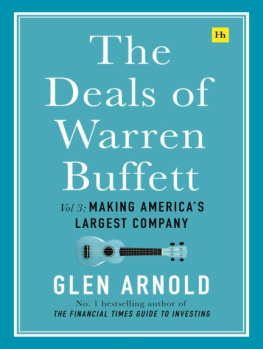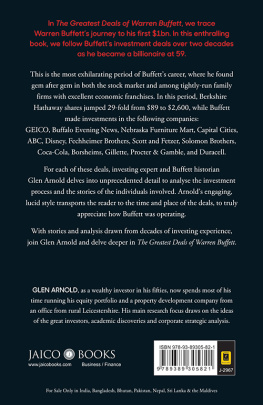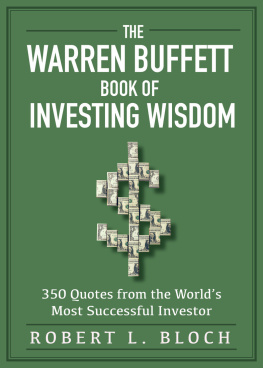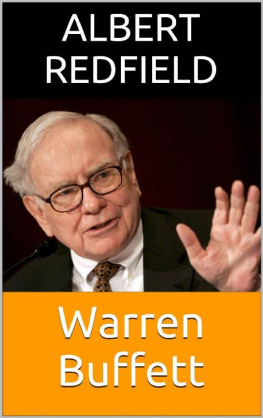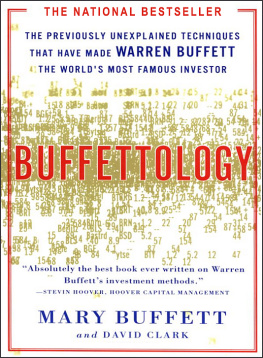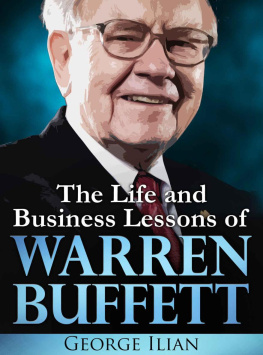The Deals of Warren Buffett
Volume 1, The First $100m
Glen Arnold
harriman house
HARRIMAN HOUSE LTD
18 College Street
Petersfield
Hampshire
GU31 4AD
GREAT BRITAIN
Tel: +44 (0)1730 233870
Email: enquiries@harriman-house.com
Website: www.harriman-house.com
First published in Great Britain in 2017
Copyright Glen Arnold
The right of Glen Arnold to be identified as the author has been asserted in accordance with the Copyright, Design and Patents Act 1988.
Hardback ISBN: 978-0-85719-603-3
eBook ISBN: 978-0-85719-604-0
British Library Cataloguing in Publication Data
A CIP catalogue record for this book can be obtained from the British Library.
All rights reserved; no part of this publication may be reproduced, stored in a retrieval system, or transmitted in any form or by any means, electronic, mechanical, photocopying, recording, or otherwise without the prior written permission of the Publisher. This book may not be lent, resold, hired out or otherwise disposed of by way of trade in any form of binding or cover other than that in which it is published without the prior written consent of the Publisher.
Whilst every effort has been made to ensure that information in this book is accurate, no liability can be accepted for any loss incurred in any way whatsoever by any person relying solely on the information contained herein.
No responsibility for loss occasioned to any person or corporate body acting or refraining to act as a result of reading material in this book can be accepted by the Publisher, by the Author, by the Contributors, or by the employers of the Author or Contributors.
Contents
About the author
Despite holding positions of Professor of Investment and Professor of Corporate Finance, Glen Arnold concluded that academic life was not nearly as much fun (nor as intellectually stimulating) as making money in the markets. As a wealthy investor in his fifties, he now spends most of his time running his equity portfolio and a property development company from an office in the heart of rural Leicestershire, far from the noise of the City of London.
His main research focus explores the question, What works in investment?, drawing on the ideas of the great investors, academic discoveries and corporate strategic analysis see www.glen-arnold-investments.co.uk. While he used to teach on this subject in the City, he would now rather concentrate on actual investment analysis, but does explain his investment choices and discusses investment ideas at newsletters.advfn.com/deepvalueshares.
He is the author of the UKs bestselling investment book and bestselling corporate finance textbook.
Also by Glen Arnold
The Financial Times Guide to Value Investing: How to Become a Disciplined Investor
The Financial Times Handbook of Corporate Finance: A Business Companion to Financial Markets, Decisions and Techniques
The Great Investors: Lessons on Investing from Master Traders
The Financial Times Guide to the Financial Markets
Modern Financial Markets & Institutions: A Practical Perspective
Corporate Financial Management
Essentials of Corporate Financial Management
The Financial Times Guide to Banking
The Financial Times Guide to Investing: The Definitive Companion to Investment and the Financial Markets
The Financial Times Guide to Bond and Money Markets
Foreword by Lawrence Cunningham
I have studied Berkshire Hathaway for more than two decades as it blossomed from a noted but niche player into a magnetic force with a worldwide following numbering in the millions. As the promulgator of a compelling philosophy of investing and business, Berkshire now boasts an entire ecosystem of people and ideas predicated upon rational capital allocation and corporate structure. Investors, managers, and scholars alike sustain this vast fruitful field of human endeavor in selecting investments, operating businesses, and producing articles, books, and conferences.
In 1996, I hosted a symposium featuring Warren Buffett and his letters to Berkshire shareholders, which I rearranged thematically and published as The Essays of Warren Buffett. At the time, Buffett was known in financial circles, and had a sizable and loyal following among Berkshire shareholders, but was not a household name. A handful of books about Buffett and Berkshire appeared around this time, led by Robert Hagstroms The Warren Buffett Way about investing, along with a biography by Roger Lowenstein.
During the ensuing two decades, Warren became famous and Berkshire a promoter and progenitor of many luminaries in business, investment, and scholarship. Warren popularized and transformed value investing from a marginal backwater to a mainstay of the field; he perfected autonomous decentralized management that others are beginning to follow; and he is far along in a process of donating virtually his entire wealth of some US$75 billion to charitable institutions. Today, nearly 40,000 attend Berkshires annual meeting, all three of the books I mentioned above and a dozen others have become big international sellers, and few people are better known or more admired on the world stage than Warren Buffett.
Books in the genre span the topics Buffett has addressed so adeptly, which may be organized, as The Essays are, into such subjects as accounting, finance, governance, investing, takeovers, taxes, and valuation. With Buffetts work spanning more than a half-century, efforts are underway to segment these topics by era, such as:
early Berkshire (through its 1978 consolidating reorganization);
Berkshire as primarily an investor in stocks (19782000); and
Berkshire as largely a conglomerate of diverse wholly owned businesses (since then).
It is the breadth and depth of Buffetts contributions to knowledge in these areas, and the sheer length of time over which he has led this company, that induces so many analysts and authors to dissect Buffetts work and Berkshires practices. As the story still goes strong, observers of the Buffett-Berkshire scene can readily learn from their latest decisions and acquisitions.
Whats more, it remains possible, despite prodigious written coverage, to gain insight from retellings of Berkshire and Buffetts past, particularly the early days. My recent book, Berkshire Beyond Buffett, is part of such a trend, a look back at how Berkshires corporate culture formed and ahead to how that culture will sustain Berkshire long after Warren takes his leave.
Glen Arnolds book offers a similar vantage point, with a very specific focus on Buffetts formative investing experiences. By returning to Buffetts earliest investments such as GEICO and Sees Candies and adding a contemporary understanding, Professor Arnold contributes useful history and lucid investment analysis, providing context, color, and lessons from Warrens school days through Berkshire circa 1978.
Buffett is fond of aphorisms, and a favorite source is the Spanish philosopher, George Santyana, who warned that those who do not remember the past are condemned to repeat it. Buffetts letters routinely identify the rationales for his investments and highlight both those that were rational and those where errors in reasoning or logic occurred. In Professor Arnolds book, these lessons are extracted and collated in sharp, clear prose.
Buffett is also fond of saying he hopes to be remembered most not as an investor, businessman, or philanthropist, but as a teacher. In The Investment Deals of Warren Buffett, readers can sense the teacher in Professor Arnold, as he lays out thoughtful block lessons in an engaging sequence. All but the most expert aficionados of the Berkshire saga will find valuable knowledge here.


